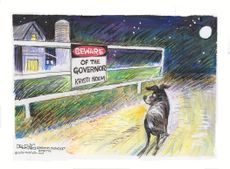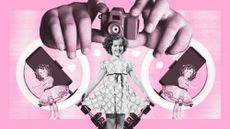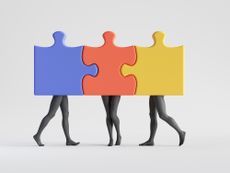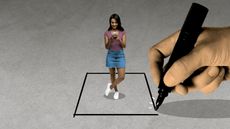Usies vs selfies: the latest web photo trend
Social bonding or rampant narcissism? Academics argue over the cultural significance of 'usies'

A year after the internet was stricken by selfie-mania, a new picture pose is sweeping through Instagram and Twitter: the usie.
Unlike the trend of 2013, the usie allows multiple people to join in on the photographic fun with group snapshots. But as the phenomenon grows, some are bemoaning the rise of yet another daftly named craze that encourages self-obsession.
So what is the usie all about, and is it a boon for friendship or a sign of rampant societal narcissism?
Subscribe to The Week
Escape your echo chamber. Get the facts behind the news, plus analysis from multiple perspectives.

Sign up for The Week's Free Newsletters
From our morning news briefing to a weekly Good News Newsletter, get the best of The Week delivered directly to your inbox.
From our morning news briefing to a weekly Good News Newsletter, get the best of The Week delivered directly to your inbox.
What is an usie?
According to Business Insider, usie-takers "are of the opinion that two is better than one". The picture, also defined as a 'group selfie', requires a crowd or a couple to take a picture together. One person in the image must also take the role of group photographer, which makes the usie a favourite of romantic partners.
And how is that different from a group photo?
One crucial distinction divides an usie from a more typical group picture: arm positioning. Business Insider reasons that since "one person in the picture has to be taking the photo", usies still contain the "signature outstretched arm" of the selfie and therefore qualify for a label of their own.
However, the usie is not the only genre to rise from the ashes of the selfie. Daily Telegraph columnist Olivia Goldhill reports that at least five other -ie labels have appeared as hashtags on social media. The new words include:
- Helfie: a selfie of the hair
- Belfie: a selfie of the derrière
- Welfie : a work-out selfie
- Drelfie : a drunken selfie
- Shelfie : a selfie of your bookshelf
When did usies start getting popular?
Ben Zimmer, a language columnist for The Wall Street Journal, claims that the term has been in use since April 2013, says AP.
And many photos taken during the selfie craze could now retrospectively be called an usie. For example, Pope Francis's pose with young worshippers at the Vatican in August 2013 easily meets the guidelines, as does Ellen DeGeneres' Twitter-crashing celebrity snapshot from the 2014 Oscars.
@KofC epic #selfie #PopeFrancis pic.twitter.com/CLYduUpxDA — Fabio M. Ragona (@FabioMRagona) August 29, 2013
If only Bradley's arm was longer. Best photo ever. #oscars pic.twitter.com/C9U5NOtGap — Ellen DeGeneres (@TheEllenShow) March 3, 2014
Instagram now has a whole page of photographs labelled with the usie hashtag, confirming that the trend has expanded beyond the celebrity world.
How are usies provoking anger?
If "the overblown ego of the selfie dominated our 2013", the usie is another step in the wrong direction, writes Olivia Goldhill, who describes these photos as "endless snapshots of self-obsession". She advocates an end to the online fad, saying that "hashtag trendsetters around the world are clinging onto this verbal trick like late-night stragglers who refuse to accept that the party is over".
The new terminology helps to disguise the true nature of the enterprise, says Oxford Dictionaries editorial director Judy Pearsall. She suggests that the -ie suffix of selfie and usie "helps to turn an essentially narcissistic enterprise into something rather more endearing".
The posting of too many romantic usies on social media can also have negative social effects, cautions Dr Benjamin Le of the University of Haverford in the Daily Mail. "There is some danger in getting too schmoopie about your relationship on Facebook," Le says. "Although your friends will think your relationship is going well, they will like you less."
Could usies actually be a good thing?
Since usies are a more social affair than selfies, some argue that focusing on group subjects for pictures may be better for fostering group connections and relationships.
"Usies are a growing trend that I think have far more social value than selfies," says Michal Ann Strahilevitz, professor of marketing at Golden Gate University in San Francisco. He claims that these photos are "more about the relationship, and less about you and your hair".
"It's magical capturing moments we share with other people," she says.
Create an account with the same email registered to your subscription to unlock access.
Sign up for Today's Best Articles in your inbox
A free daily email with the biggest news stories of the day – and the best features from TheWeek.com
-
 Try 6 free issues of The Week Junior
Try 6 free issues of The Week JuniorSpark your child's curiosity with The Week Junior - the award-winning current affairs magazine for 8-14s.
By The Week Published
-
 Netanyahu's Rafah attack vow snarls truce deal
Netanyahu's Rafah attack vow snarls truce dealSpeed Read Hours before the truce deal was to be finalized, Netanyahu said Israel will invade Rafah regardless
By Peter Weber, The Week US Published
-
 Today's political cartoons - May 1, 2024
Today's political cartoons - May 1, 2024Cartoons Wednesday's cartoons - beware of governor, biting debates, and more
By The Week US Published
-
 'Are We Dating the Same Guy?': do Facebook groups harm or help?
'Are We Dating the Same Guy?': do Facebook groups harm or help?Talking Point Women share their relationship experiences to try to stay safe on dating apps but critics highlight legal and emotional issues
By Harriet Marsden, The Week UK Published
-
 The not-so-hidden dark side of child influencers
The not-so-hidden dark side of child influencersunder the radar Is putting children in the spotlight worth the risk?
By Theara Coleman, The Week US Published
-
 Polyamory is having a moment(s)
Polyamory is having a moment(s)Why Everyone's Talking About The latest in loving more — and those who want less of it
By Scott Hocker, The Week US Published
-
 From 'thunks' to mixed reality, the future of books is interactive
From 'thunks' to mixed reality, the future of books is interactiveThe Explainer What is in store for literature in an increasingly digital world?
By Theara Coleman, The Week US Published
-
 Stephen ‘tWitch’ Boss dead at 40: Ellen pays tribute to Fairytale Weddings host
Stephen ‘tWitch’ Boss dead at 40: Ellen pays tribute to Fairytale Weddings hostSpeed Read Celebrity DJ and dancer found dead in Los Angeles hotel room
By Chas Newkey-Burden Published
-
 If Trump returns to Twitter, he'll win every news cycle
If Trump returns to Twitter, he'll win every news cycleTalking Point
By Joel Mathis Published
-
 How false notions of moral autonomy scrambled American parenting
How false notions of moral autonomy scrambled American parentingopinion American parents are great at keeping our kids' bodies safe. But what about their minds?
By Jason Thacker Published
-
 Grammys drop Kanye from performance lineup due to 'concerning online behavior'
Grammys drop Kanye from performance lineup due to 'concerning online behavior'Speed Read
By Grayson Quay Published